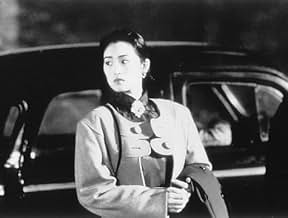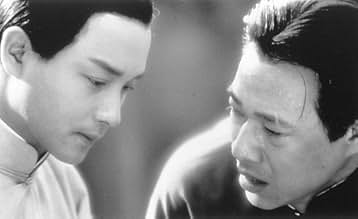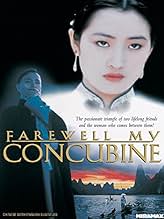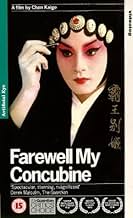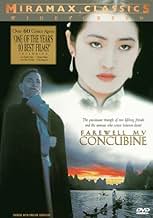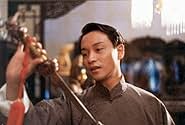IMDb RATING
8.1/10
36K
YOUR RATING
Two boys meet at an opera training school in Peking in 1924. Their resulting friendship will span nearly 70 years and endure some of the most troublesome times in China's history.Two boys meet at an opera training school in Peking in 1924. Their resulting friendship will span nearly 70 years and endure some of the most troublesome times in China's history.Two boys meet at an opera training school in Peking in 1924. Their resulting friendship will span nearly 70 years and endure some of the most troublesome times in China's history.
- Nominated for 2 Oscars
- 24 wins & 12 nominations total
Zhenxiang Fei
- Shitou as a Child
- (as Yang Fei)
Featured reviews
As far as story and content goes this owes more than a little to The Last Emperor (1987), which is not surprising since Director Kaige Chen was a member of the cast of that film and no doubt was influenced by its success. But stylistically, and especially as the film was directed and cut, "Farewell, My Concubine" is original and stands alone. If The Last Emperor was a Western movie about the Chinese political experience in the Twentieth Century, then Farewell, My Concubine is a Chinese movie, influenced by the West, about that same experience. While the former focused on the emperor and those around him, "Farewell..." focuses on two actors of the Beijing opera. Admittedly, "Farewell..." is long (I saw the 157-minute version) and sometimes strays from it intent, but gains and maintains power and keeps our interest mainly because everything is presented in a starkly-lit, intensely focused manner. The epic-like story itself is good if a little pedestrian at times. The lavish and stunning sets in opulent color and design, are just fascinating to view. Everything from the extras in the crowds to the porcelain for tea is carefully chosen and presented. Particularly striking are the traditional costumes and makeup, shown to advantage through the fine camera work. But what makes the film is the glimpse we get of the world of the Beijing opera and its traditions. From the Dickensian boy's school for the actors to the intrigues with patrons and the political powers that be, there's the sense of a world beyond our experience. The acting was also excellent. The beautiful Gong Li, who played Duan's wife was captivating as she displayed a wide range of emotion. Leslie Cheung as Dieyi, "the concubine," and Fengyi Zhang as Duan, "the king," were also excellent. The boys who played the actors as children, especially the actor who played Douzi, were first rate.
10bluzman
As an WASP American married a lady from Mainland China, I have a great interest in and curiosity about China. My wife's mother and father actually saw these men perform. I have discussed this movie with many Chinese friends, most of whom saw it before coming to this country. Some of them knew the story from real life as well as the movie. They are quick to point out the accuracy of the story in its detailing of Chinese history from the end of the last dynasty until its end during the Cultural Revolution. They also claim that the major happenings in the movie are real events, not the norm for most of Hollywood's "real life" stories. One point of conjecture in the movie is the sexually of Dieyi. It is presumed he is/becomes a homosexual. However, from what I have learned about the Peking/BeiJing Opera through reading and discussions, it is more likely that Dieyi was virtually unaware of his own sexuality. As opposed to being a hetero or homosexual, he was asexual in a way like it had be surgically removed from his being. It had been taken from him through the rigors of his training and years of performance. His love for Xiaolou is powerful, maybe even surpassing ordinary man/woman love, but platonic in as much as his mind is devoid of its sexuality. He suffers the same jealous anger and sense of betrayal as might be found when a wife discovers the cheatings of her husband, and reacts, unfortunately, accordingly (Heroin). His real, enduring love is performing. It is the one constant that has seen him through. He throws himself into it, being willing to perform for anyone, even as it drives the story to the end. The end of the movie is not satisfying to everyone. It was not a Hollywood ending. However, it was reality.
I've seen this movie more times than I can count and I cry every time. I first saw it in the theater in 1993 and I was rooting for it to win Best Foreign Film Oscar, but it lost to the far inferior Belle Epoque (Spain). As to the person who wrote that this film made Cheng Dieyi seem like he was made to be gay because of abuse, I think you need to take another look. To my mind, Dieyi seemed to be infatuated with Shitzou as soon as he got there. However you look at it, this is a film that has great performances all around. I especially loved Leslie Cheung as the adult Cheng Dieyi (requiem eternem Leslie, 1956-2003), not to mention Gong Li. An excellent film, but be forewarned: it's almost three hours long. 10/10
The film paints the story of two actors, from their first encounter at school in the Twenties through their success as stars of the Peking Opera, difficulties during the Japanese occupation, the Communist takeover in 1949 and the traumas of the Cultural Revolution in the Sixties
For the so-called Fifth Generation of Chinese filmmakers, the film touches new ground on two fronts In the first place, though it does not avoid from acknowledging the sufferings under the old regime, it takes an embittered view of Communist society and of the Cultural Revolution specifically
The two friends, Xiaolou and Dieyi, adopt a young man, Xiao Si, who becomes one of the Red Guards and quickly informs the political sins of his benefactors
Second the film is a love story of a rare kind Dieyi is a homosexual and suffers rejection when Xiaolou begins an affair with Juxian (Gong Li), a gorgeous prostitute The personal conflict of each character is the heart of this exceptional movie
For the so-called Fifth Generation of Chinese filmmakers, the film touches new ground on two fronts In the first place, though it does not avoid from acknowledging the sufferings under the old regime, it takes an embittered view of Communist society and of the Cultural Revolution specifically
The two friends, Xiaolou and Dieyi, adopt a young man, Xiao Si, who becomes one of the Red Guards and quickly informs the political sins of his benefactors
Second the film is a love story of a rare kind Dieyi is a homosexual and suffers rejection when Xiaolou begins an affair with Juxian (Gong Li), a gorgeous prostitute The personal conflict of each character is the heart of this exceptional movie
'Farewell My Concubine' is, in a word, excellent.
Though often portrayed as haunting and disturbing, it's also quite touching at times... attributed largely to the outstanding emotional performances by the film's lead cast. Hands down, Chen Kaige has directed one of the most beautiful films involving the fall of the great Imperial China... and subsequently... the friendship of two of China's greatest leading opera performers.
Leslie Cheung's role as Cheng Dieyi, the tormented 'concubine' of the story, is absolutely astounding, and is probably one of his greatest performances to date. Fengyi Zhang plays well opposite Cheung, and Gong Li is fantastic as always. The production sets are superb, as are the costumes and cinematography.
Definitely a must see for all fans of foreign cinema, and certainly worthwhile for all newcomers.
10 out of 10
Though often portrayed as haunting and disturbing, it's also quite touching at times... attributed largely to the outstanding emotional performances by the film's lead cast. Hands down, Chen Kaige has directed one of the most beautiful films involving the fall of the great Imperial China... and subsequently... the friendship of two of China's greatest leading opera performers.
Leslie Cheung's role as Cheng Dieyi, the tormented 'concubine' of the story, is absolutely astounding, and is probably one of his greatest performances to date. Fengyi Zhang plays well opposite Cheung, and Gong Li is fantastic as always. The production sets are superb, as are the costumes and cinematography.
Definitely a must see for all fans of foreign cinema, and certainly worthwhile for all newcomers.
10 out of 10
Did you know
- TriviaJackie Chan was originally offered the role of Duan Xiaolou due to his own childhood experience of training in the Peking Opera. But he turned it down, fearing that the film, which deals with themes of homosexuality, might tarnish his image.
- GoofsWhen Douzi is first examined by the owner of the opera troupe, his extra finger is on his right hand below the thumb. When he withdraws the hand from the opera troupe owner, he pulls back his left arm. When his mother cuts the extra finger off a few moments later, it is now on his left hand, next to his pinkie.
- Quotes
Master Yuan: A smile ushers in the spring.
Master Yuan: A tear does darken all the world.
Master Yuan: How truly does this befit you. To you... only you are possessed of such charm.
- Alternate versionsThe version presented in the U.S. is different from the original, longer cut, that was distributed internationally. The following differences exist in the U.S. version:
- The scene where Duan and Juxian are drinking after their wedding was originally directly after the wedding scene, rather than after the bloodletting at the Yuan-Cheng dinner.
- How long is Farewell My Concubine?Powered by Alexa
Details
Box office
- Budget
- $4,000,000 (estimated)
- Gross US & Canada
- $5,549,086
- Opening weekend US & Canada
- $69,408
- Oct 17, 1993
- Gross worldwide
- $7,437,725
- Runtime
- 2h 51m(171 min)
- Color
- Sound mix
- Aspect ratio
- 1.85 : 1
Contribute to this page
Suggest an edit or add missing content


